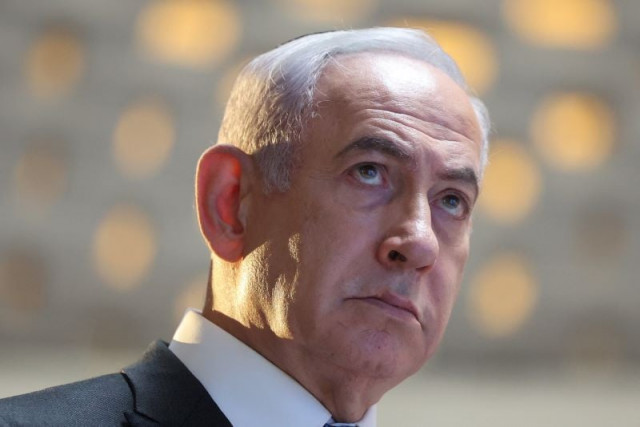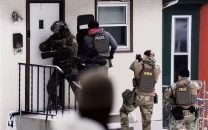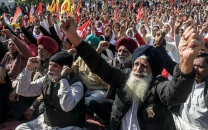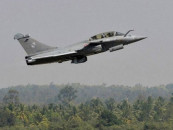Drone launched from Lebanon targets Netanyahu’s home: Israeli military
Israeli military said it had intercepted two more drones after one hit near Netanyahu's home in Caesarea

A drone was launched towards Israeli Prime Minister Benjamin Netanyahu's home in the northern Israeli town of Caesarea on Saturday, his spokesman said, adding that the premier was not in the vicinity and there were no casualties.
Earlier, the Israeli military said that a drone was launched from Lebanon and that it had hit a building. It was not immediately clear what the building was.
Two more drones that crossed into Israeli territory were intercepted, the military said.
There were no casualties reported, according to the Israeli ambulance service and police said explosions had been heard in Caesarea, coastal town where Netanyahu has a holiday home.
The drone attack was not immediately claimed by the Lebanese Iran-backed group Hezbollah, which has been trading fire with Israel since last October, or any other militant group.
At least 21 killed in Israeli attacks on towns in northern Lebanon
Israel expanded its military operations against Hezbollah freedom fighters in Lebanon, launching attacks that killed at least 21 people in the Christian-majority town of Aitou, according to Lebanese health officials.
The Israeli attack targeted a house that had been rented to displaced families, injuring an additional eight people.
Rescue workers sifted through debris, while images of burned vehicles and damaged trees spread across the media.
In addition to its escalating invasion, Israel ordered the evacuation of 25 villages in southern Lebanon, urging residents to move north of the Awali River, approximately 60 kilometres from the Israeli border.
Prime Minister Benjamin Netanyahu, addressing the press after visiting a military base where four Israeli soldiers were killed by a Hezbollah drone strike, vowed to continue attacking Hezbollah "without mercy" throughout Lebanon, including Beirut.
The conflict between Israel and Hezbollah resumed in late 2023 when Hezbollah began firing rockets in support of Hamas freedom fighters.
While Israel’s military campaign in Lebanon continues, tensions are rising with the United Nations peacekeeping force, UNIFIL, stationed in southern Lebanon.
Several UN peacekeeping positions have come under fire during clashes between Israeli forces and Hezbollah.
The UN Security Council expressed concern over the safety of peacekeepers in the region, as UNIFIL reported that Israeli tanks had entered its base over the weekend.
Israeli attacks have reportedly disrupted UNIFIL’s ability to monitor violations of international law.
Recently, UN reported that Israeli tanks breached a UNIFIL peacekeeping base in southern Lebanon on October 13, marking a recent accusation of Israeli violations.
According to UNIFIL, two Israeli Merkava tanks forced their way through the base’s main gate before dawn. Following their entry, nearby shell explosions created smoke, affecting the peacekeeping personnel stationed there.
Netanyahu, however, dismissed accusations that Israeli forces had deliberately targeted peacekeepers, calling the claims "completely false."
He reiterated his call for UNIFIL to temporarily withdraw from combat zones, citing Hezbollah’s use of UN positions to launch attacks against Israeli forces.
Despite this, UNIFIL spokesman Andrea Tenenti confirmed that the mission would remain in place under its Security Council mandate, emphasizing the importance of maintaining an international presence in southern Lebanon.
Meanwhile, in Gaza, the humanitarian crisis deepens as Israeli airstrikes continue.
Since the start of Israel’s military operations in October 2023, over 42,289 Palestinians have been killed, and nearly 100,000 others have been injured.
In the latest attack, at least 29 people have been killed in the latest wave of Israeli attacks across Gaza.
The northern Gaza Strip remains under siege, with approximately 400,000 Palestinians trapped in dire conditions.
Israeli strikes have increased in northern Gaza, with at least 29 people killed in the latest wave of attacks, including 10 who were queuing for food in Jabalia, according to Palestinian medics.
Since October 7, Israel's military response has since been relentless, with attacks and ground invasions targeting both Gaza and Hezbollah strongholds in Lebanon.
As the war drags on, international calls for a ceasefire continue, with growing concerns about the safety of civilians and peacekeeping forces.
However, Israel, backed by the US, remains firm in its resolve to dismantle Hezbollah’s military infrastructure and secure the return of displaced Israeli civilians from the north.



















COMMENTS
Comments are moderated and generally will be posted if they are on-topic and not abusive.
For more information, please see our Comments FAQ